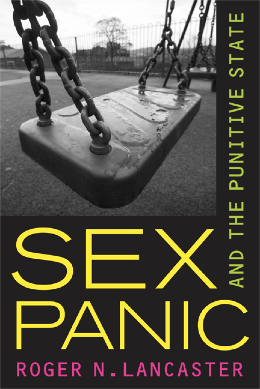“Sex Panic and the Punitive State is a passionate, wide-ranging analysis of a culture of American fear…. Its focus on sex and crime is centrally on the male sexual predator, especially the pedophile figure: but its richly archived and narrated examples reach from 19th century victimology to the present, from slavery to terrorism, and their legitimation of the preemptive moral strike. A manifesto against the contemporary paranoid style and its hold on the law, media and you, this book is an important contribution to LGBTQ studies and to American studies in general.” — Lauren Berlant, English, University of Chicago
"Fresh, critical and engaging…. A landmark book." — Michael Sherry, History, Northwestern University
"Brilliantly explores the fears and anxieties of the United States in recent decades, showing how they continuously participate in the shaping of the nation.” — Didier Fassin, Institute for Advanced Study, Princeton University
“Gripping and provocative. Lancaster effectively weaves historical and ethnographic accounts along with his own experiences to illuminate the dangerous tilt in America's legal system toward a presumption of guilt.… An important book for anyone interested in how crime and justice are perceived in society." — Jonathan Simon, Berkeley Law School and Center for Criminal Justice

